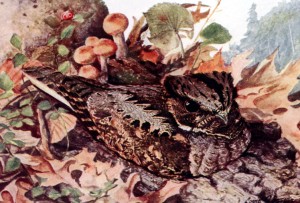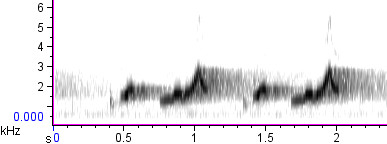Whip Split!

According to the grapevine, the AOU Checklist Committee has voted to split Whip-poor-will into two species. This split has been long anticipated, as the eastern and southwestern forms breed a thousand miles apart in different habitats, show slight average differences in size and plumage, and (most importantly for this blog) sing slightly different songs.
One of the primary lines of evidence cited in the split proposal was the recent publication of a molecular phylogeny of the nightjars by Han et al. (2010). Among many other species, the study looked at the two populations of Whip-poor-will (the eastern vociferus group and the arizonae group of the Mexican highlands), along with their close relative the Dusky Nightjar of Costa Rica (Caprimulgus saturatus). The study says that the three taxa “form a group… but their inter-relationships remain unresolved. This suggests that these three taxa should be given equivalent taxonomic status.” In other words, they recommend either splitting the Whip-poor-will, or lumping it with Dusky Nightjar.
Evidently the committee preferred the former option. No word yet on what they chose for names, so I’ll call them “Eastern” and “Mexican” for now. Here is a sampling of the songs of both forms, plus the Dusky Nightjar for comparison:



The three song samples above progress through the taxa from north to south. Note how with each successive southward jump, the song elements become longer, more widely spaced (both within and between strophes), and burrier (more squiggly on the spectrogram). It’s clear that these three taxa are closely related, but it’s also easy to tell them apart, even by ear, primarily by speed and level of burriness. However, it seems to me that the Dusky Nightjar is more different from the two North American forms than they are from one another; in addition to being much slower, it is also significantly higher-pitched.
Note that if the AOU accepts the recommendations of Han et al. when it comes to splitting genera, then the whole Whip-poor-will group (along with Chuck-will’s-widow, Buff-collared Nightjar, and possibly Common Poorwill) will be moved from the genus Caprimulgus into Antrostomus — but no such proposal is currently before the committee as far as I know.
4 thoughts on “Whip Split!”
Reminds me of that hilarious spoof book by the Sills, “Little-Known and Seldom-Seen Birds of North America,” which parses the “range” of species down to “Will” and various other combinations.
This was a kick! It is like I thought: Though both birds accent the WILL part of the song, the Eastern one has THREE distinct syllables and sounds purer, with the WILL perhaps a little lower pitched than Arizonae’s WILL. Arizonae’s WILL seems about at the interval of a sixth from the Whip-poor part. And the song is faster and as you say, burrier. You could tell that the Dusky Nightjar was related to the other two even though it sounded quite different. (Thank God there’s one I DON’T have to deal with!)I didn’t get what you meant by “song elements longer and more widely spaced between strophes as you go south”? The only sense I could make out of that was that there were obviously MORE Whip-poor-WILLS uttered by the Arizonae species ‘cuz he sang faster! I have actually SEEN the Arizonae in the Chiricahuas. But only HEARD vociferus in eastern Kansas one time. My, what a nice opportunity you are offering people to hear these birds so well! I just wish it didn’t take so long to BUFFER them all the way through FIRST. But it’s worth the wait! Mymm P.S.(I have copied down all the new information for my Avisys records–thanks!)
Comments are closed.